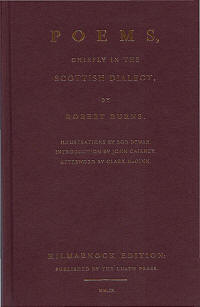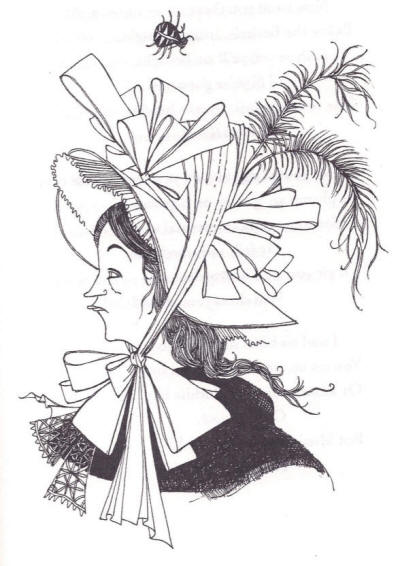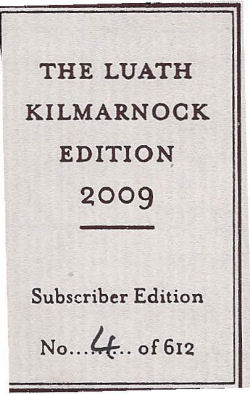 I'm
holding in my hand Volume 4 of the 612 copies of the Subscriber Edition
of Poems, Chiefly
in the Scottish Dialect
by Robert Burns, published by the Luath Press, which sells for £40. I
must also tell you that there is another edition of the same book
entitled The Luath Kilmarnock Edition which sells for £15. Both were
published in 2009 to celebrate the 250th
anniversary of the birth of Burns. All 612 copies of the Subscriber
Edition are signed and numbered. With apologies to an old Coca-Cola
commercial, both editions are wonderful copies of “the real thing” which
was first printed in 1786. New material by three key people identified
with this book, John Cairney, Bob Dewar, and Clark McGinn, make it a
fascinating read. Each is an expert in his own right.
I'm
holding in my hand Volume 4 of the 612 copies of the Subscriber Edition
of Poems, Chiefly
in the Scottish Dialect
by Robert Burns, published by the Luath Press, which sells for £40. I
must also tell you that there is another edition of the same book
entitled The Luath Kilmarnock Edition which sells for £15. Both were
published in 2009 to celebrate the 250th
anniversary of the birth of Burns. All 612 copies of the Subscriber
Edition are signed and numbered. With apologies to an old Coca-Cola
commercial, both editions are wonderful copies of “the real thing” which
was first printed in 1786. New material by three key people identified
with this book, John Cairney, Bob Dewar, and Clark McGinn, make it a
fascinating read. Each is an expert in his own right.
John
Cairney:
Known most of his life as “the man who played Robert Burns”, Cairney
wrote the superb introduction to this book. He is an actor, writer,
lecturer and consultant, yet he simply describes himself as writer,
actor, and raconteur. He is as familiar with television, radio, and
theatre performances as he is writing about Burns. He is an unusual man,
to say the least. Cairney is best known for his work on Burns, but
earlier in his career he earned a PhD in his study of Robert Louis
Stevenson. As recently as April of this year, Dr. Cairney returned to
Glasgow to give a lecture on “Robert Louis Stevenson and Theatre” for
the Friends of Glasgow University. Among his other publications I have
read and can highly recommend to you are
On the Trail of Robert Burns,
The
Luath Burns Companion
and The Man Who Played Robert Burns, An
Autobiographical
Journey. I even
have an old 78 record set entitled John
Cairney Tells the
Robert Burns Story
which is highly entertaining. In conclusion, I think he will always be
remembered as a painter - with brush, oils and words.
A quote or
two from Cairney’s Introduction:
“There are some events in the Scottish Story which are considered
significant by all Scots” and Cairney goes on to list the Battle of
Bannockburn in 1314, the Declaration of Abroath in 1320, the Darien
Disaster in 1699, the Union of the Parliament in 1707, and among the
important dates in the life of Scotland is 31 July 1786, “the
publication date of the first, and only, book of poems published by
Robert Burns of Ayr”, Poems, Chiefly in
the Scottish Dialect. To be listed amongst
these events and dates by one of the top Burns scholars shows how
important Burns’ book of poetry is 250 years after his birth!
“In no
time he [Burns] was as popular in the gentry’s with-drawing rooms as the
performing pig in the Grassmarket, and recited for his supper at the
best tables in Edinburgh. But he wrote nothing new in the capital except
‘To A Haggis’ and a sweet little song, ‘A Rosebud by my Early Walk’ for
a 12-year old girl. He hated his life among the literati and he hated
himself for pandering to them. He knew he must get away or he’d never be
his own man again. The matter was decided for him when…”
Bob Dewar:
Then
there is the well-known political artist Bob Dewar. The illustrator of
many books, he has worked for The Scotsman and other newspapers. Having
held many exhibitions, he has “had caricatures hung in the House of
Commons”. Born in Edinburgh he published, at the tender age of 16, his
first illustration. He was “specially commissioned” to illustrate this
book, and you will enjoy over a dozen of his own original line drawings.

To A Louse
His work, to me, brings to mind John Kay’s 19th-century
work, A Series of Original
Portraits and Character
Etchings and more
recently, and much more affordable, the book by Sheila Szatkowski
entitled Capital
Caricatures, A Selection of Original
Etchings by John Kay. Yes, Dewar is that
talented! You can also see more of his work in Valentina Bold’s 2009
edition on The Merry Muses.
I personally look forward to more of Dewar’s work, hopefully in the near
future. Like most of us, I know what I like, and I like Bob Dewar’s
work!
Clark
McGinn
Another
treat for me is that the book’s Afterword was written by Clark McGinn,
immediate past president of the Burns Club of London and currently
probably the most well-known international Burns speaker on the planet.
I am intrigued by the word “afterword” since it is seldom seen in
today’s publications. But you will see, as I did, these pages by Clark
speak about Burns in ways you will find to be refreshing and
contemporary. Too often we look back when talking about Burns but, as
Clark is wont to do, he speaks of the continuing legacy of Burns with a
look forward, not just dwelling on what happened between 1759 and 1796.
Clark is the author of two popular books –
The Ultimate Burns Supper Book
and
The Ultimate Guide to Being Scottish.
He is a contemporary speaker with an
equally contemporary message about Burns, a poet who needs to be brought
up to date by many of today’s speakers. Over the past five years Clark
has traveled 105,300 miles speaking about Robert Burns. That is equal to
4.2 times around the globe. He has given 63 speeches during that time in
20 different cities and eleven continents! Could it be that Clark McGinn
just may well be “The Ultimate Burns
Speaker”?
Quotes
from McGinn’s Afterword:
“Kilmarnock saw that first edition of a young man’s poems published in
1786 and Burns has not been out of print for a single day since.”
“…and
(theft being the most profitable form of flattery) in pirate copies in
Dublin, Belfast, Philadelphia and New York”…just a year later in 1787!
“If
poetry is an ability to take complexity and distil it into order, then
RB captures the genius of the human soul.”
“More
people celebrate the life of Burns each year – whether at a formal Burns
Supper, or just informally around their own kitchen table – than
populated Scotland the day he died.”
How many
of you have ever held in your own hands an original Kilmarnock edition
of Burns’ poems? A few years ago I witnessed a former president of the
Burns World Federation hold a Kilmarnock in his hands for the first time
and could not help but notice how his eyes watered with emotion while
doing so. Here was a man who had traveled the world over representing
the Federation and speaking to hundreds of people. It is indeed a rare
occurrence to hold that book in your hands. Think of the odds.

Only 612 copies of Poems, Chiefly in the
Scottish Dialect
were published in 1786. Today, approximately 70
can be identified worldwide. As to holding an original in your hands,
chances are you will make your first million dollars first. The chances
are extremely slim you will ever own a copy. The odds are in your favor
to become a multi-millionaire before you own a copy! This little book of
240 pages turned Scotland on her literary ear, and since its publication
in 1786 until now, 224 years later, Scotland has never been the same!
It has been many years since a facsimile of the
Kilmarnock was published. You might find an older edition out there
somewhere but chances are you will pay hundreds of dollars for it. Since
you have an opportunity to buy a beautiful new hardback facsimile today
for a reasonable price, I urge you to visit the website
www.luath.co.uk
to find copies of the limited and number 612 Subscriber’s Edition. You
will discover what is called in the trade the “bookshop edition” as
well. The good folks at Luath Press will direct you how to complete your
order. (FRS: 6.3.10)
